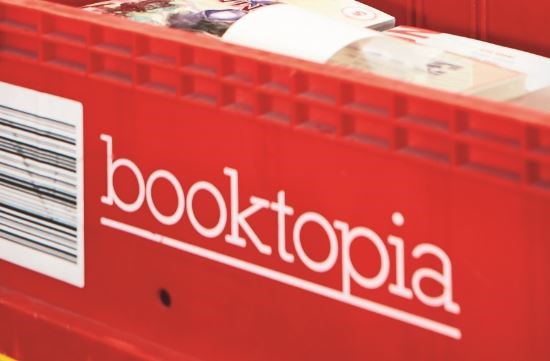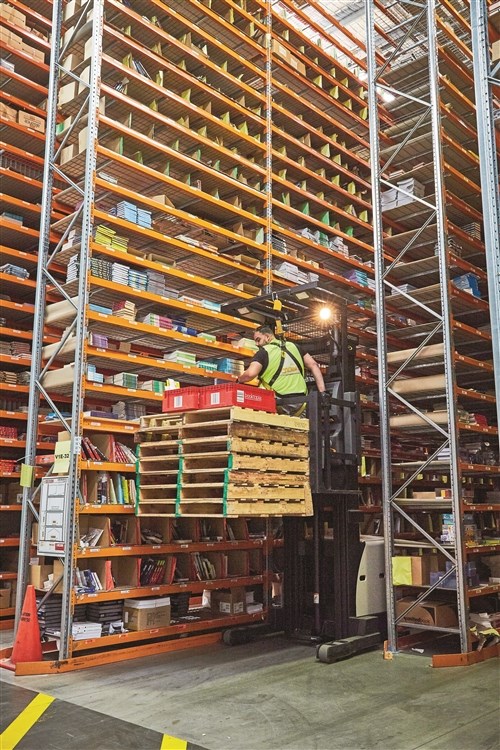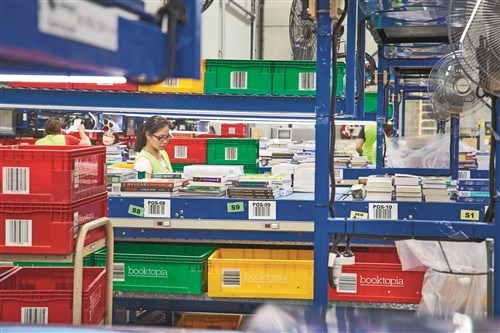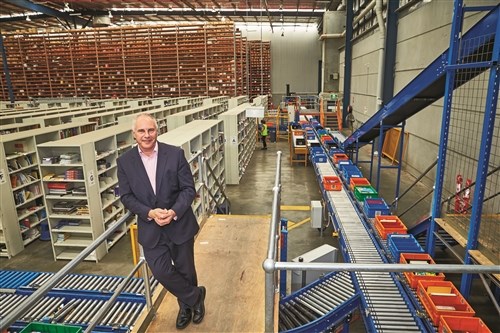Online book seller Booktopia has grown from a $10 a day budget to a $130 million book business in 15 years, with sales unaffected following the arrival of global e-commerce giant Amazon in Australia
Focused on bolstering what the business does best, Booktopia chief executive Tony Nash wasn’t too spooked about the arrival of US retailing giant Amazon.
With an established presence in Australia, Booktopia reached $80 million revenue in 2016 – the year Amazon came to our shores. It expects that figure to grow to $130 million this year.
With over 200 staff, $10 million worth of automation and $13 million worth of software, Booktopia has $6 million worth of stock across 150,000 of titles at its 13,000 square-metre facility at Lidcombe in Sydney.
Booktopia’s sales have skyrocketed because Amazon has shifted its focus from books, Nash explains.
“Three per cent of their revenue is books now,” Nash says.
“It used to be 100 per cent when it started but it’s now three per cent and a lot of people don’t realise that.
“They did everything we expected them to do – they’re going to focus on other product lines.
“If you go on their webpage nothing in there tells you that there’s books, you have to go much deeper to find the books.
“The reason being when you’re everything to everyone you can’t be one thing to one bit of the market.
“When we did our research around the world there are companies that are flourishing in North America and Europe where Amazon is very well established because they’re focused on one product only and they do it very well.”
A SIDE PROJECT
With one item being sold every 6.1 seconds, it’s fair to say Booktopia is doing something right.
The business was started with Nash’s brother Simon and brother-in-law Steve Traurig. The trio worked on Booktopia after hours after spending their days running the family’s internet marketing consultancy.
“The side project of starting an online book store was because we had got Angus and Robertson to the top of Google and that introduced us to the book industry who used another company to manage their site to fulfil those orders and this company who manage Angus and Robertson were managing 80 bookstores and websites, so I used that platform to get going,” Nash says.
“My brother did the forecast for me; he said I would make one sale per day for the first three months, and then two sales per day for the next three months.
“It took me three days to sell my first book and then by the end of the month I had done $2,000 worth, by the fourth month I was up to $30,000 a month and by the end of the year $100,000 a month and by the end of two years $200,000 a month.”
Booktopia now accounts for 14 per cent of Australian book sales and is the country’s biggest online bookseller.
INVESTMENT
Becoming a book distributor and wholesaler over the past year, publishers are now using Booktopia for their publishing services, which allows for further discounting.
“Publishers are now pointing at Booktopia as the Booktopia publishing services, as the Australian distributor for their products,” Nash says.
“We have Australian and international publishers on that list, so that gives us deeper discounting.
That model is something we’re really pushing because it drives us deeper into the book eco culture of how books are bought and sold in Australia.
“Because we’ve invested in our automation and infrastructure here in the conveyors and packing machines, we’ve been able to fund the logistics component of our business that a normal book distributor would struggle to invest because they simply do not have enough volume going through.”
There are conveyors, automatic packing machines, scanning and box and bubble wrap making machines at the Lindcombe site.
Booktopia has invested $13 million into its own software, building a website, a warehouse management system, content systems, algorithms and automation software over the last 12 years.
With a team of 25 people, it constantly upgrades its systems. The warehouse has 150,000 titles in stock ready to ship. It has also donated over $750,000 in cash and books to literacy-based projects.
Starting the company with no external investment, Nash has succeeded due to his knowledge of books and logistics.
Booktopia operates five days a week and uses Australia Post trucks for deliveries; with up to five semi-trailers delivering orders each day.
The company is the seventh largest Australia Post customer and expects to do 2.5 million parcels this year, of which 5.5 million are individual books.
DEATH OF THE E-BOOK
Readers are burnt out on e-books, and it shows in Booktopia’s sale of physical books.
Nash says that the physical book market is making a comeback after years of decline, with the demand for Kindles disappearing.
One never to be intimidated by such technology, he says he predicted a decade ago that e-books would never take over hardcovers.
He learned about the first Amazon Kindle when at a book expo in America.
Amazon founder Jeff Bezos had then unveiled such plans but Nash wasn’t convinced that it would succeed.
“I thought to myself: ‘Oh my god, that’s going to change the world’ and then I realised, ‘hold on a sec that’s a device the Koreans, the Chinese, the Japanese and Taiwanese are going to copy and the publishers hate Amazon, they want to make sure the e-files are going to be available for everyone to get access to’,” Nash says.
“I could see straight away it wasn’t going to be exclusively theirs but I could also tell that people love books and there’s a lot of books that would never go digital.
“I could see the book industry would still be even better and the quality of printing has improved as well.”
What’s changed for Nash over the 16 years is experience; he’s learnt that sometimes things just don’t turn out the way you expect them to.
“I think the most important is that my ego. The idea of being successful and running a large company as a youngster and who that made me and how I think about today, which is neutral, a zero emotion, has probably been the biggest difference,” he adds.
“I’ve been available, my ego doesn’t get involved in terms of the company; Booktopia has won all these awards but Tony Nash didn’t win those awards, they were given to a company, so the more that you think you are the company, the better it is.”
FULL CAPITAL RAISE
At the time of writing, Booktopia was about to undertake a crowd-funding opportunity, with the aim of raising $10 million through investment platform Equisite, with the cash poured into three core areas of the business; looking to boosting automation, stock and liquidity.
“We don’t actually need to do it because we’ve gotten from zero to $130 million without any funding, so I know we can get to $200 million and $300 million without any funding,” he says.
Read about Booktopia’s logistics move a few years ago, here
“What it enables us to do is to invest faster, which is good. The other thing is that the business is worth in terms of its value so much now that there’s no problem for the shareholders – my brother, my brother-in-law and I and a handful of employees who have been strategic with us for a while – to share some of that equity.
“With the current infrastructure, we can comfortably inbound 30,000 individual books per day and we know that our customers are going to be demanding 60,000 books in and out over the next three years, so we need to start investing,” Nash adds.
“At that stage, we’ll be turning over $250 million and we need to be ready.”
CUSTOMER FOCUSED
Had Booktopia not been in Australia, online bookselling would have come from offshore, Nash believes.
“Because the way we see things and the way we have invested locally, no one else was prepared to do it, we saw the book industry not like book industry people,” Nash says.
“I saw things differently and therefore some of the tactics, strategies and initiatives which come down to one of the nuggets – the question we were asked from the very beginning is what do our customers want?
“When you answer that truthfully and honestly and you do what they want, then you will succeed.”
With no plans of running his own transport and logistics arm, Nash says the company might consider diversifying into a small courier service in Sydney.
“You’ve got to have the scale so it would be how many deliveries are we doing in Sydney – maybe there’s a thousand a day in Sydney, so how many people do we need to have on the road to deliver the thousand and can we do those cheaper that Australia Post or a courier company?”
ONLY WAY IS UP
By using only 25 per cent of its warehouse capacity at Lindcombe, Nash hopes to add stock horizontally.
“We’re already doing it but in the next 18 months we’ll still continue to invest,” he adds.
“Most of it is to do with shelving and therefore stock, the amount of units we can hold here in this building is three million and we have 600,000.
“When you go up and you’ve got stock that’s going more vertical, it’s the conveyors that are expensive to connect all of that together.”
The longest a book has sat on Booktopia’s warehouse is two years.
The turnaround of stock is 14 times each year.
“So, with a $6 million worth of stock and we have $130 million in revenue, that’s a massive stock turn,” he adds.






